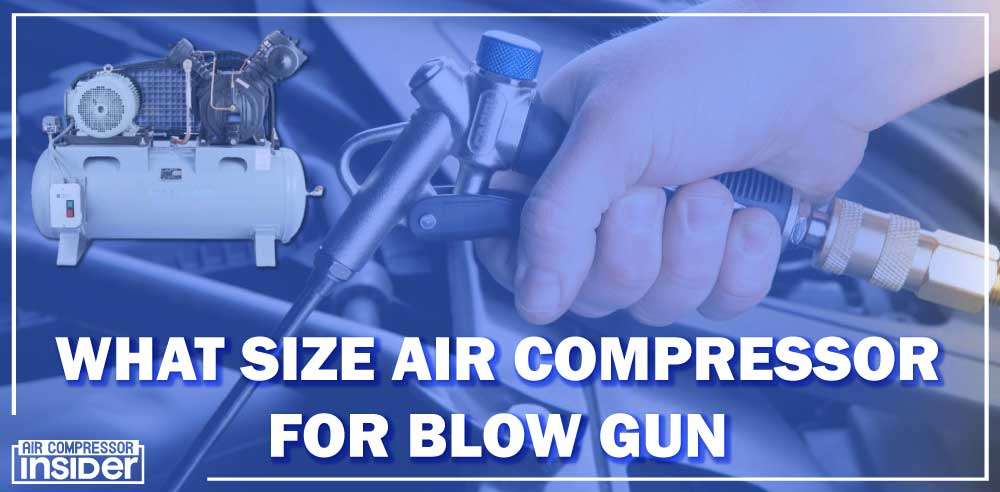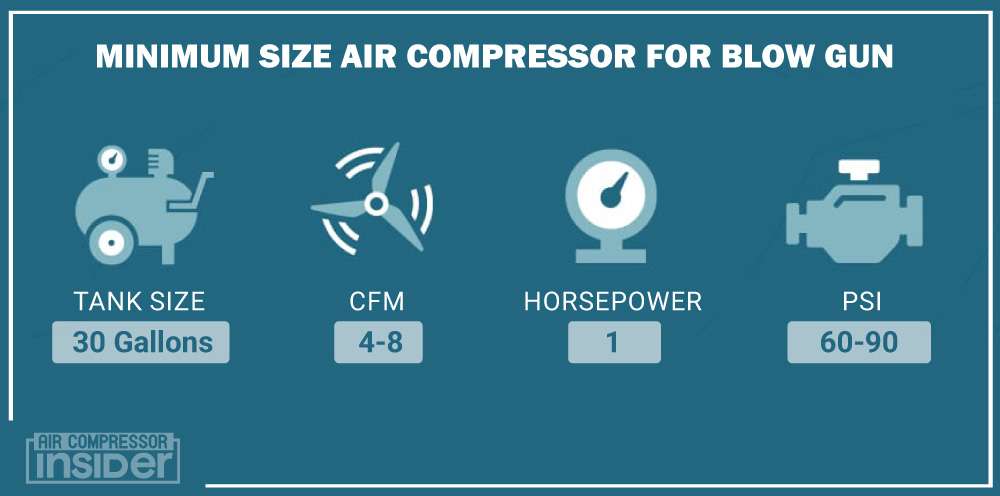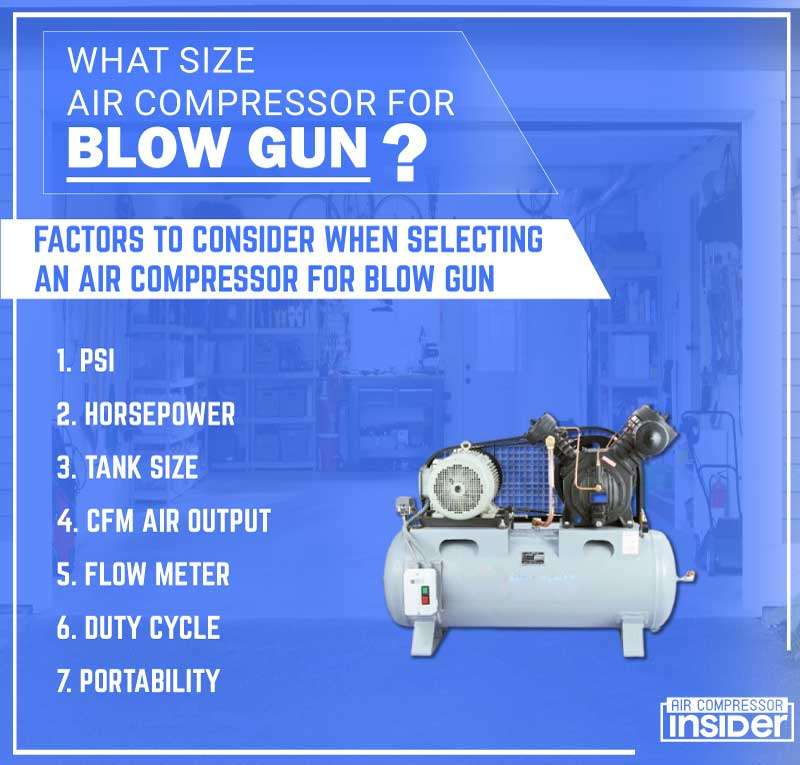When selecting an air compressor for blowing operations, it is important to consider a variety of criteria. To know what size air compressor for blow gun will depend on the amount of power you need, the size of your workspace, and the number of tools you plan to use.
For example, if you only need to blow off dust from your workbench or garage floor, a small portable air compressor may be sufficient. However, if you are planning to operate multiple pneumatic tools simultaneously, then a larger stationary unit with more capacity is likely needed.
What Size Air Compressor For Blow Gun

For choosing air compressor for blow gun, you want to make sure that your selected compressor can handle the pressure requirements necessary for effectively powering your pneumatic tools. Different types of compressors have different maximum psi (pounds per square inch) ratings. Make sure to factor in the psi requirements of all your tools when selecting a compressor, as having too low of a rating may not provide enough power for all of your equipment.
In addition to size and pressure capability, it can also be beneficial to look at other features such as noise level and ease of maintenance. Some compressors are specifically designed for high-noise work environments, while others have features like oil-less motors or easy maintenance access ports that make them ideal for DIY projects. Consider these options if you want to make sure that your compressor are right for the job without sacrificing functionality.
- What Size Air Compressor For Blow Gun
- What Is A Blow Gun?
- Types of Blow Guns:
- 7 Important Factors to Consider When Selecting an Air Compressor for Blow Gun:
- Factors in Detail:
- How Much PSI To Run Blow Gun With An Air Compressor?
- How Much HP Does An Air Compressor Need For Blow Guns?
- What Tank Size Is Necessary For Blow Guns?
- How Much CFM Do I Need To Run A Blow Gun?
- What Is A Flow Meter And How Can It Be Helpful?
- What Duty Cycle Should I Consider When Selecting An Air Compressor?
- What Other Factors Should I Consider When Selecting an Air Compressor?
- Frequently Asked Questions
- Conclusion:
For a blow gun, you’ll need an air compressor with a CFM rating of at least 4-8 and a PSI rating around 60-90. HP should be 1, and the tank size should be around 30 gallons or higher.

What Is A Blow Gun?
A blow gun is a specialized air tool that uses compressed air to blow debris and dust away from surfaces. It consists of a hollow tube, typically made out of metal or plastic, with one end connected to an air compressor and the other end fitted with a nozzle. The user then points the nozzle at the desired surface and releases a powerful stream of air to remove the unwanted material. This can be useful for a variety of applications, from surface preparation to industrial cleaning and for painting cars. It is important to note, however, that blow guns should not be used on any object or surface that could be damaged by the high-pressure blast of air.
Types of Blow Guns:
When selecting a blow gun, you want to make sure that the nozzle size and air pressure is compatible with your application. There are several different types of blow guns available, each designed for a specific task.
1. Mini Blow Guns:
Mini blow guns are small and lightweight, making them ideal for light dusting and spot cleaning.
2. Medium Blow Guns:
Medium blow guns are suitable for most general-purpose applications, such as surface preparation and painting.
3. Large Blow Guns:
Large blow guns have a higher airflow rate and stronger air pressure, allowing them to handle more challenging tasks like industrial cleaning or removing large chunks of debris.
In addition to the size of the nozzle, you also want to consider the type of material used in construction. Metal nozzles tend to be more durable than plastic ones but can also become clogged with dust and other particles over time. Plastic nozzles may not be able to withstand high pressures but work well for lighter jobs. It’s important to select a nozzle that is compatible with your compressor as well as appropriate for the job.
By taking into account the size, type, and pressure requirements of your air compressor and pneumatic tools, you can ensure that you have the right setup for a successful blow job. With the right equipment and preparation, your blowing operations will be efficient and effective.
7 Important Factors to Consider When Selecting an Air Compressor for Blow Gun:

When selecting an air compressor for blow gun, there are a few important factors to consider, such as:
1. PSI Rate:
The maximum psi rating of the compressor must match the requirements of your pneumatic tools.
2. Horsepower:
The HP (horsepower) rating should be sufficient to provide enough power for all the tools you plan on using.
3. Tank Size:
Consider the size of the tank when determining how long you can run your air compressor without needing to refill it.
4. CFM Air Output:
Make sure that the CFM (cubic feet per minute) rating is adequate for powering all of your pneumatic equipment.
5. Flow Meter:
A flow meter can help keep track of how much air pressure is being used and can be helpful if you need to adjust settings mid-operation.
6. Duty Cycle:
Consider what type of duty cycle you need for your blow gun application. If you plan to be running the compressor for long periods of time, select a unit with a higher duty cycle rating.
7. Portability:
Some compressors are designed for portability so that you can move them from job site to job site. This can be beneficial if you work in multiple locations.
By considering these factors when selecting an air compressor, you will be able to find the best fit for your needs and increase the longevity and performance of your pneumatic tools. Investing in quality equipment will help ensure a successful and productive blowing operation.
Factors in Detail:
Now let’s discuss these 7 factors one by one in detail.
How Much PSI To Run Blow Gun With An Air Compressor?
The amount of psi (pounds per square inch) required to run a blow gun with an air compressor depends on the size and type of nozzle as well as the air pressure rating of the compressor. Mini blow guns typically require 30-60 psi, while medium and large ones may need up to 90 psi or more. It is important to make sure that the maximum psi rating of your compressor matches the requirements of your pneumatic tooling.
How Much HP Does An Air Compressor Need For Blow Guns?
The amount of horsepower (HP) you will need for a blow gun application varies depending on the size and number of tools being used. A small 1/2 HP unit can generally power one or two small blow guns, while a larger 3-5 HP compressor can handle multiple tools at once.
What Tank Size Is Necessary For Blow Guns?
A tank size of at least 30 gallons will be sufficient for most home garage air compressor use and also for light industrial applications. If you plan to use your air compressor for extended periods of time, it’s best to select a unit with an even larger capacity tank so that you can run it without having to refill it.
How Much CFM Do I Need To Run A Blow Gun?
The airflow rate (CFM) required to power a blow gun depends on the size of the nozzle as well as the pressure rating of the compressor. Smaller nozzles typically require less CFM than larger ones, so make sure you select the right size for your needs.
What Is A Flow Meter And How Can It Be Helpful?
A flow meter measures air pressure and can be helpful in controlling airflow during blowing operations. This device can also help you keep track of how much air pressure is being used and can be handy if adjustments are needed mid-operation.
What Duty Cycle Should I Consider When Selecting An Air Compressor?
The duty cycle of an air compressor tells you how long it can run continuously before needing to rest. If you plan on running the compressor for extended periods of time, look for one with a higher duty cycle rating (e.g., 100%).
What Other Factors Should I Consider When Selecting an Air Compressor?
In addition to the power and size requirements, it is also important to consider portability and noise levels. Some compressors are designed for portability so that you can move them from job site to job site. Noise levels should also be taken into account as they can affect both your working environment and the surrounding area.
By taking these factors into consideration when selecting an air compressor, you will be able to find the best fit for your needs and increase the longevity and performance of your pneumatic tools. Investing in quality equipment will help ensure a successful and productive blowing operation.
Frequently Asked Questions
Question #1
How much PSI to run Blow Gun with an air compressor?
The amount of psi (pounds per square inch) required to run a blow gun with an air compressor depends on the size and type of nozzle as well as the air pressure rating of the compressor. Mini blow guns typically require 30-60 psi, while medium and large ones may need up to 90 psi or more.
Question #2
How much HP does an Air Compressor Need for Blow Guns?
The amount of horsepower (HP) you will need for a blow gun application varies depending on the size and number of tools being used. A small 1/2 HP unit can generally power one or two small blow guns, while a larger 3-5 HP compressor can handle multiple tools at once.
Question #3
What Tank Size is Necessary for Blow Guns?
A tank size of at least 30 gallons will be sufficient for most home and light industrial applications. If you plan to use your air compressor for extended periods of time, it’s best to select a unit with an even larger capacity tank so that you can run it without having to refill it.
Question #4
How Much CFM Do I Need To Run A Blow Gun?
The airflow rate (CFM) required to power a blow gun depends on the size of the nozzle as well as the pressure rating of the compressor. Smaller nozzles typically require less CFM than larger ones, so make sure you select the right size for your needs.
Question #5
What is a Flow Meter and How Can It Be Helpful?
A flow meter measures air pressure and can be helpful in controlling airflow during blowing operations. This device can also help you keep track of how much air pressure is being used and can be handy if adjustments are needed mid-operation.
Question #6
What Duty Cycle Should I Consider When Selecting an Air Compressor?
The duty cycle of an air compressor tells you how long it can run continuously before needing to rest. If you plan on running the compressor for extended periods of time, look for one with a higher duty cycle rating (e.g., 100%).
Question #7
What Other Factors Should I Consider When Selecting an Air Compressor?
In addition to the power and size requirements, it is also important to consider portability and noise levels. Some compressors are designed for portability so that you can move them from job site to job site. Noise levels should also be taken into account as they can affect both your working environment and the surrounding area.
Question #8
How Can I Maximize My Air Compressor’s Performance?
To ensure your air compressor works at its full potential, regular maintenance is key. Make sure to check filters, change oil if necessary, and inspect the pressure switch assembly. Additionally, if your compressor has a manual drain valve, be sure to open it periodically and let any accumulated moisture escape.
Question #9
How Can I Increase the Longevity of My Air Compressor?
To increase the longevity of your air compressor and make sure you get your money’s worth, make sure to follow the manufacturer’s guidelines when it comes to maintenance. Regularly check oil levels and filters and change them as necessary. Also, avoid overloading the unit by not exceeding its maximum capacity when using multiple tools at once.
Question #10
What Are Some Tips For Safe Operation Of An Air Compressor?
Always make sure to follow safety guidelines when using an air compressor. Wear proper eye protection, make sure your work area is well ventilated, and disconnect the power before performing any maintenance. Additionally, do not use any damaged components and never attempt to repair a damaged air compressor yourself – contact a qualified technician instead. Finally, always read labels and instructions carefully before using your air compressor. By taking all necessary precautions, you can ensure safe and efficient operation of your air compressor.
Conclusion:
An air compressor can be an incredibly useful and powerful tool when used properly for operating blow gun. By considering tank size, CFM, flow meter, duty cycle, portability, noise levels, and safety guidelines before making a purchase or using your existing equipment, you will know what size air compressor for blow gun is required for getting the most out of your compressor and maximize its performance. Additionally, regular maintenance is essential to ensure that your compressor remains in good working condition for years to come. With the right knowledge and care, you will have a reliable and efficient air source for any job.
